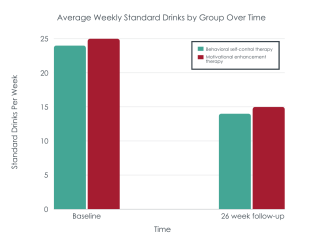A COMPARISON OF TWO TREATMENTS FOR INDIVIDUALS INTERESTED IN REDUCING ALCOHOL USE

Many people seeking treatment for severe alcohol use disorder begin with a goal of alcohol abstinence. There are also, however, many less severe cases who hope to reduce their drinking rather than stopping altogether, and evidence suggests this is possible for some individuals, usually those with these less severe drinking problems.
This study examined whether one of these interventions is superior to the other in a head-to-head comparison. The researchers hypothesised that behavioural self-control training’s special focus on helping individuals moderate their drinking would produce superior drinking outcomes.
This was a randomised clinical trial conducted in Stockholm, Sweden with 250 participants who received either 5 sessions of behavioural self-control training or four sessions of motivational enhancement therapy, with follow-ups at 12-, 26-, 52-, and 104 weeks post-baseline. The paper summarised here reports preliminary results from this trial up to the week 26 assessment.
As a conclusion, it is important that alcohol use disorder treatments are available that support those with goals of reducing their alcohol use as well as those with abstinence goals. Like other studies comparing manualised treatments with strong theoretical rationale, behavioural self-control training and motivational enhancement therapy produced very similar improvements on alcohol use outcomes over time, where participants halved their weekly drinks and 50% (vs. 80% initially) were drinking within lower-risk guidelines by the end of the study